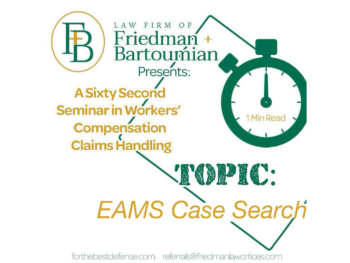Most workers’ compensation claims professionals are aware of the axiom, “what the employer knows, the claims administrator is presumed to know.” This phrase is interpreted to means that if an employer is aware of a fact pertaining to a workers’ compensation case, then its administrator is also presumed to be aware of it, under the principle of imputed knowledge. For example, if an employer is aware of an industrial injury but fails to report it, then any penalty for non-payment of benefits becomes the administrator’s liability. The purpose of today’s blog is to discuss what happens when the situation is reversed, where we ask, “is the claim administrator’s knowledge imputed on the employer?” This question is usually raised when dealing with issues involving Labor Code §132a discrimination actions. Allow us to explain in greater detail.
Primary treating physicians often submit disability slips to claims administrators without forwarding copies to employers. Therefore, when a claims administrator is aware of an injured worker’s disability status but the employer is not, then any disciplinary action taken against the employee for not providing a disability status to the employer would be construed as a violation of LC §132a. Injured workers have successfully argued that knowledge of disability by the claims administrator is imputed on the employer. The legal term for this argument is called, “constructive knowledge.”
Black’s Law Dictionary (10th Ed. 2014) defines constructive knowledge as “[k]nowledge that one using reasonable care or diligence should have, and therefore that is attributed by law to a given person.” By performing only minimal effort through a simple phone call to the administrator, an employer can easily ascertain if an employee is authorized to remain off work. By failing to communicate with the administrator, an employer who terminates an injured worker for not providing a work status report would be in violation of LC §132a. It makes no difference if the status report was not provided to the company as long as it was presented to the administrator. The foregoing was memorialized via Appellate case law in Rods Food Products, Inc. v. WCAB (Ross), which held that if the claims administrator is aware of the employee’s disability status, then said knowledge is imputed on the employer. In addition, Regulation 10112.1(q) states, “An employer has knowledge of information contained in the records of its third-party administrator.”
Should our readers have any questions regarding interpretation of the laws pertaining to imputed knowledge and its implications, please feel free to approach the lawyers here at F+B rather than to guess at its meaning. We are here to serve and educate.


Leave a Reply